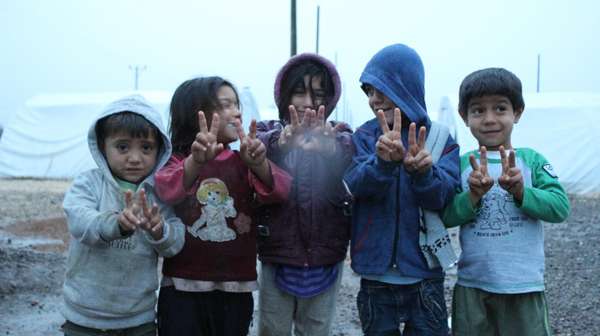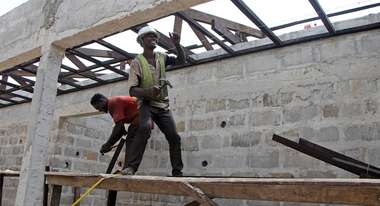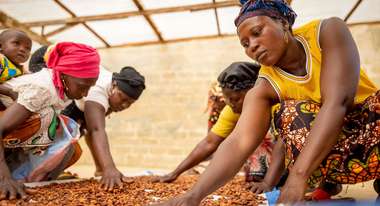Welthungerhilfe and its partners support people in Syria, Türkiye and Lebanon.
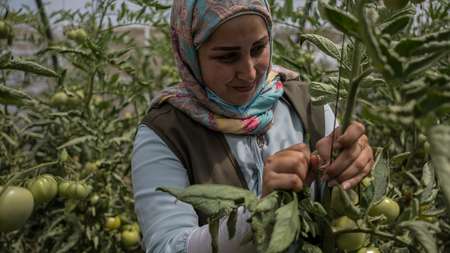
Diversity and cohesion give hope
Zainab remembers every single year in Lebanon: seven to be exact. Seven years since the Syrian teacher could no longer work; seven years since she left her hometown of Homs in ruins.
Today she is 38, has three children - together with her husband - and lives in Lebanon's Bequaa Plain. It's actually only a short, roughly three-hour drive from Homs, but she still does not dare to return to her home country. Her youngest daughter, Asanat, who is two-and-a-half years old, has never been to Syria. Her older children can barely remember home.
No country has taken in more Syrian refugees in proportion to its population than Lebanon. Nearly one million registered refugees from Syria find protection here. Yet the country is on the verge of economic collapse. Rapidly rising inflation is compounded by the effects of the Corona pandemic. Large parts of the local population are no longer able to secure their livelihoods, the situation of the refugees is also deteriorating and social tensions are increasing. A Welthungerhilfe agricultural project in the Bequaa Valley is counteracting this, strengthening local markets and creating livelihoods.
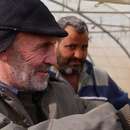
I get help from two Syrian families. Together we cultivate the fields and the greenhouses and learn from each other.
Zein Kassem Raad Participants of the projectPoverty is greatest in rural areas
Zainab feels safe in Lebanon, but she also admits that it is not easy. The desire to return to Syria is strong; one day she hopes to do so. "My children don't go to school here, which means I teach them myself. Of course I would like to work full time, but we live here as refugees. There are few job opportunities and the economic situation is not easy even for the Lebanese."
As if under a burning glass, Lebanon's major problems are evident in Bequaa, Lebanon's most important region for agriculture. A civil war and subsequent crises have severely set back the agricultural sector. Around 40 percent of agricultural workers live in poverty; they are worse off than any other occupational group. But since thousands of families fled here from Syria, the pressure on resources and jobs has increased many times over. Baalbek-Hermel is the name of the administrative district in which the fertile valley lies.
Improved opportunities for the Lebanese and Syrian population
However, everything is lacking here to exploit the region's potential. Farms are too small to generate sufficient profits, and there is neither information about effective agriculture nor financing options for investments. Yet it would be so important to grow more food, because to meet all demand, Lebanon must import up to 80 percent of its needs. A Welthungerhilfe project with the Lebanese organization LOST, supported by the German Federal Ministry for Economic Cooperation and Development, is working to counter this. It aims to improve opportunities and living conditions for Lebanese and Syrian communities, increase agricultural profitability and reduce social tensions.
For the past few weeks, Zainab has been attending a food processing course. Here she is learning to pickle or preserve food, which she can then store and sell over the next few months. This gives her a small monthly wage. A total of 100 women are being trained by LOST in the Bekaa Plain.
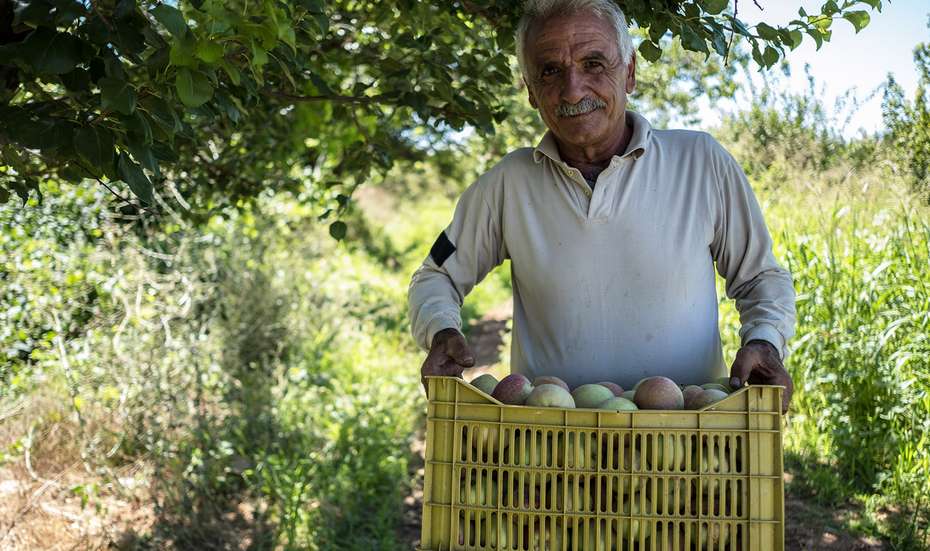
Better prices through cohesion
A serious problem for many farming families in rural areas is their limited access to local markets and lack of networking with other producers. They often have to sell their vegetables at low prices, in some cases even throwing away part of the harvest. Most farmers depend on a single person to trade the produce and freely set the prices. By establishing farmer cooperatives and networks, Welthungerhilfe and LOST help smallholder farms to improve their market position through joint buying and selling. Their products become more competitive.
"We work with farmers who receive seeds and fertilizer from us on a seasonal basis. We are happy to buy some of the agricultural yield back from the farmers to produce the pickled foods. This helps us, but also the farmers. We design our programs in such a way that we support people practically from the beginning to the end; from the field to the fork, so to speak," says Tarek Chibli, project manager at LOST.
Lebanese and Syrian farmers are trained in efficient and profitable farming techniques. They learn about new products and are encouraged to increase the diversity of their varieties so that they can cultivate the fields all year round, harvest more and of higher quality, and thus reliably generate better incomes. "Multiple varieties also mean a kind of risk management in case of crop failure," explains project participant Osmen Dib Bayen. And his niece Najeya Mhamad Bayen adds, "Before we participated in this project, we planted our tomatoes in the field. Now we use the greenhouse. It makes the work much easier, and besides, we don't depend on the weather."
More cooperation - less prejudice
For Zainab, the food processing course is important for two main reasons. "This is now the first time in seven years that I have a job again,'' she says, pushing fresh green tomatoes into a canning jar. "At the same time, I'm also meeting new people here. Some are also from Syria, others are from Baalbek, the city where we live now. We get along well and some of us have become friends in private. For me, that means integration. It makes me feel more at home."
Zainab has decided to open her own business as soon as she completes the course. "Product development and marketing are also part of our un-teaching, which will help me to start my own business," says the mother of three.
How things will go for the family in the long term is unclear, Zainab says. "For now, we'll stay here in Baalbek," she says resolutely. "I wouldn't have thought of working in another profession again, but maybe this is a new beginning now," the Syrian teacher says with a laugh.
How Welthungerhilfe helps in Lebanon
- Lebanese and Syrian farmers receive training in efficient and profitable cultivation techniques.
- New products ensure diversity of varieties and thus more reliable harvests.
- Farmer cooperatives enable competitiveness.
- Improving social cohesion and psychological well-being in target communities.
- Agricultural training for Lebanese and Syrian youth.
- A total of 12,500 people will directly benefit from the project.




